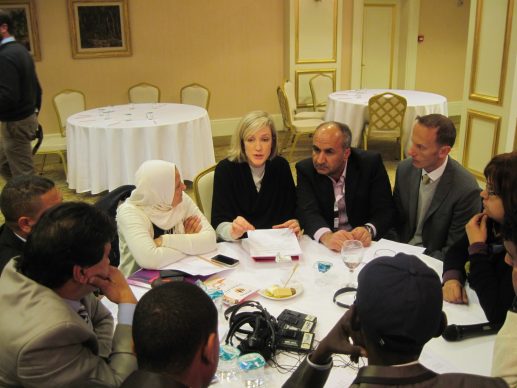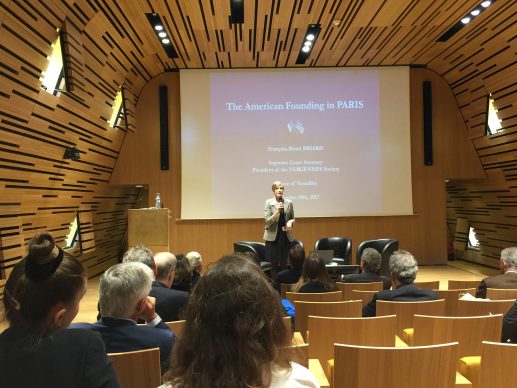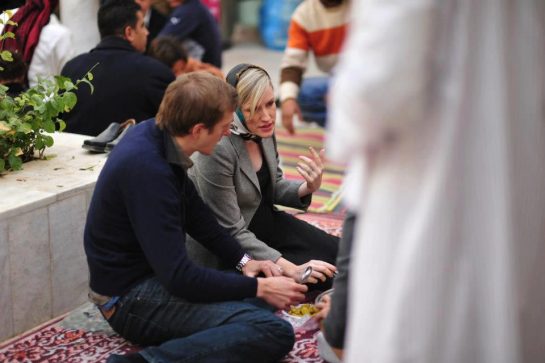Lorianne Updike Toler began studying the US Constitution while in elementary school and her interest charted her educational course through multiple graduate degrees. As a constitutional legal historian, she has founded organizations to provide resources for constitutional study. She has been teaching at New England Law: Boston, and will begin teaching at Northern Illinois University College of Law in the fall.
How did you become interested in studying the US Constitution and making that the focus of your career?

Lorianne Updike Toler
I grew up in Provo, Utah and was homeschooled during middle school when my mom was a citizen lobbyist at the Utah state capitol. I went with her to the state capitol when the legislature was in session and did my schoolwork in the galleries and committee meetings, frequently running errands to get bills from the bill room or take notes to members of the legislature. I created a digital game to memorize all the legislators’ names. I never needed to learn how a bill became a law, as I lived it.
Later, I also went to lectures with my mom during high school to hear Cole Durham, who helped write some of the Eastern Bloc constitutions after the fall of communism and the Soviet Union. In this way, I was exposed to constitution-writing at an early age. I knew it was something that one could do as a profession.
After high school, I graduated from BYU (public relations) and BYU Law, completed a Masters in history at Oxford, and am ABD for a doctoral degree at the University of Pennsylvania, which I still hope to finish at some point.
While I was in London after completing my program at Oxford, it was a pivot point in my career. I had been focused domestically on constitutional interpretation and improving it through the better use of history. I founded ConSource, an online library of historical sources related to the creation of the US Constitution after I graduated from law school and before my Masters. But then when I was done with the Masters, finding a job in that career was impossible because, let’s be clear, nobody cares about the US Constitution in England!
That’s a really narrow niche!
My then-husband sat me down and said, “Let’s look at your goals,” and I had this constitution-writing thing up in the corner. He said, “Why don’t you work on that?” I said, “I’m not old enough.” He said, “You know 95 percent more than 95 percent of the people. You should do that.”
The Arab Spring was taking off. [The Arab Spring was a series of anti-government, pro-democracy uprisings in 2010-11, affecting multiple countries in the Middle East and northern Africa.] I had already missed the wave in Egypt and Tunisia. But there was a civil war in Libya at that point and I thought, “I might be able to catch this wave.” I began writing about Libya, based on a first visit I’d done, and I was able to meet some folks with the United Nations there, including the constitutional focal point. We worked together kind of behind the scenes – I helped him with a few things, and he helped me to know what was happening on the ground so I could write a series on constitutionalism there. Eventually, enough people read it that they wanted it translated and they wanted to meet me. So I had an opportunity to go to Libya a second time. I got some funding and went in the beginning of 2013.
That’s awesome for your spouse to encourage you in your goals like that.
What was interesting was I desperately wanted to become a mother. We were planning to start fertility later that year, and I thought I didn’t have to worry anymore because we were going to start fertility. Of course, when I stopped worrying about it, that’s when I got pregnant. But had I gotten pregnant just one month earlier, I would not have been able to go to Libya. So it was a testament to me that the Lord cared about my career. He wanted me to have this opportunity. My semester ended – I was then doing the doctorate at Penn – and I literally had a month between being 32 and 36 weeks pregnant, when you can’t fly anymore, when I could go to Libya. So I did it.

Lorianne in Libya
I didn’t tell anyone there that I was pregnant, so when I arrived, they were like, “Whoa, wide berth!” There was a tense moment when I went home. I’d done all my research on which airline had the latest time frame I could fly pregnant. I got to the Tripoli airport – out to here, with my doctor’s note – I was one day beyond when I was supposed to fly. I didn’t think I was showing that much but apparently the airline attendant knew better. They looked at my letter and they looked at the calendar, and I was just praying internally, “Please, please, let me get home.” I did, and safely delivered my son in London a month later.
But I had a backup plan. This is also how I knew that the Lord really wanted me to do this. The first person I met on the first trip to Libya, when I went for a different entity altogether, was an obstetrician. With a private practice. With a generator. I actually had an appointment for an ultrasound while I was in Libya. If anything happened, my biggest concern would have been getting my son – who would have been Libyan had he been born there – into the United Kingdom. Given the political state of affairs, it would have been difficult.
That month that I spent in Libya changed the course of my career. I don’t help with constitution writing per se; I think it’s poor practice for foreign nationals to step in and write a nation’s constitution. I focus on best practices for constitutional process – how to do it, not what is in the constitution.
The last day I was in Libya, my office mate, a Libyan who ran a civil society organization, said that what we need is a big comparative study that can be written at various levels that shows all the decision points for a process – their length and their quality. Could I do that? Because of that trip and that question, fifty percent of what I do now is focused comparatively. I shifted my research, and half of what I do now is focused on using good comparative studies in history to improve the process of constitution-writing.
You look at all these different countries: this is how it’s done, these are the results when it’s done in these particular ways, are you going to select or elect the drafters, what should their composition be like. I focus on the 2009 United Nations guidelines, which sets out the standards for constitution writing processes: inclusivity, participation, and transparency. It turns out there’s no hard data behind those standards, so I’m trying to fill that gap.
I got funding from the UN Development Programme for fifty hours of work, and it turned out to be a 500-hour project, of course. My research team and I looked at eighteen different constitutional processes to identify the different elements: presence, duration, and – it’s a hard one to judge – quality. We basically wrote a book to put it all together but also distilled it down into an Excel spreadsheet. It was one of three resources that the UN shared with the Libyan Constitution Drafting Assembly.
Then the UN in New York got a hold of it and said, “This is gold; we need more of this.” So a project now in the works is to expand it and look at all constitution writing since World War II, which is really difficult because you’re basically doing histories of all these different processes. It’s difficult especially considering all the different languages. But getting that data will help us understand and perhaps develop best practices for writing a constitution.
In the meantime, I do historical studies for some of the oldest constitutions. I just got a piece accepted for publication on New Hampshire’s constitutional process from 1784. Next, I’ll be doing Massachusetts, and then Vermont. There’s of course the US constitutional process. Then you skip across the pond and look at Poland in 1791, France from 1791 to 93. Their processes mirror Virginia and Pennsylvania.
Poland didn’t have a lot of exposure – there weren’t enough documents – they knew about Benjamin Franklin and George Washington, but how they wrote their constitution was more of a symbolic gesture to what had happened in the US, because they didn’t really know much. There was one Polish general who had fought in the American revolution – he came back and led the charge, but he wasn’t aware of how they did it because they didn’t write it down. Nobody took notes on how you write a constitution. They wrote constitutions but didn’t provide any kind of a “dummy’s guide.”
Here’s what’s interesting and I have done this work – I presented it at a conference at the Palace of Versailles in 2017 that I put together. In France, their processes from 1791 and 93 looked like the processes from Pennsylvania and Virginia, in part because of the Americans who had been in France who had been successful – Franklin and Thomas Jefferson. So they basically communicated how they wrote constitutions. Then you jump over to Holland in the later 1790s and their process looks almost exactly like Massachusetts, because John Adams was there, and he’d just written the Massachusetts constitution. He did a tour of the Netherlands to raise money in the 1780s. He brought with him all the Massachusetts documents, all the debates, the drafts and he told people, “Look what I did.” So that showed them how to write a constitution, and it lasted until Napoleon came along. The United Netherlands constitution is one of the oldest in the world, and I suspect that is in large part because of the process they followed, patterned after the Massachusetts process.
I haven’t done all the work, but preliminarily, the Netherlands looks like they followed Adams’ rubric. So there’s something about the US process that was figured out in Massachusetts and New Hampshire that then was incorporated on the US federal level and exported to the Netherlands. Norway and a lot of the Scandinavian countries also have very old constitutions, so I want to study all of these. This isn’t something that’s been looked at in terms of their prosperity. A lot of people talk about the Scandinavian countries being so successful and so socialistic – how does this work – some of the answers might lie in their constitutional history. So this is an area of active interest for me that applies to today, not just part of the past.
Since I was in Libya in 2013, their constitutional process was a model of organization and rule-following. They did a really good job until they had two civil wars and things fell apart. They were able to produce a draft in 2017. But right now there’s a cart before the horse issue – they can’t issue a new government without a constitution, but there’s no motivation to produce a constitution because the people in power – you can see the issue. But there are more movements afoot to make sure Libya has a constitution at some point.
The project I’m working on now for Libya looks at the ramifications of resuscitating the old constitution from 1959. It’s somewhat problematic because it had a monarchy, and usually when you put a monarch over a lot of oil wells, bad things happen. But if you look at it procedurally, there were a lot of good things that happened and that’s more of what I focus on.
How does the Church’s perspective on the US constitution being inspired by God factor into your career motivation?

Lorianne Updike Toler presenting at a conference at the Palace of Versailles.
There’s a really cool verse that Cole Durham pointed out in a lecture I went to at Oxford when I was there. I didn’t know this verse and he elucidated an interpretation that I hadn’t considered before. It says: “That law which is constitutional belongs to all mankind.” (D&C 98:5) His point was that Joseph understood that “constitutional” referred to the Preamble, and that those laws which accorded with it belonged not just to the people of the US, but those of the globe. I interpret that verse differently as relating to constitutional process — that constitutions written according to good constitutional process and involve the people and abides by its own rules and the rule of law is something that all people deserve.
President Dallin H. Oaks has a great talk in the April 2021 General Conference, The Divinely Inspired Constitution, where he discusses what aspects of the Constitution are divine. You could say that there are norms or standards within the US Constitution that were inspired without getting down to the word level. There were obviously some major problems with the original Constitution. It’s sometimes hard for people to grasp that something can be inspired, but not every single detail is God’s truth. There is a difference.
I think President Oaks does a really good job. You could write a book-length article on each of his five tenets and I’ve written one about popular sovereignty – what it means truly for “We the People” to be involved in constitution-writing. It was so revolutionary! They took this principle from the Enlightenment that was only theoretically worked out but never practically, because if you look at the Glorious Revolution in England on which it is based, there’s nothing really popular about that revolution. It was parliamentary sovereignty that they conceptualized as popular sovereignty, but the people really had very little to do with it except for electing their Parliamentarian every five to ten years. It wasn’t a popular revolution, it was a parliamentary revolution.
You’re using the term “popular” in terms of the population, not “popular” as in well-liked.

Lorianne Updike Toler
“We the People” – the people are bringing this about. In the American states, you see this very real moment – this is something I point out in the history I wrote on New Hampshire – they have a sense that they are creating history. With the Revolutionary War and the breakdown in government, they had the opportunity to step in and push power forward, to be the propellers of power and the controllers of power.
There’s a wonderful point when John Adams was at the forefront and kept pushing for state constitutions, and Congress said No. New Hampshire finally said, “Look, we don’t have a charter. We can’t fall back on our charter and rework it – we have none. We have a literal power vacuum. Please let us write a constitution.” They brought a petition from the people to Congress but the petition was made up by the Congressmen themselves – they never got the petition from New Hampshire, so the delegates in Congress finally said, “We know we need one, we’re just going to make it up.” The New Hampshire assembly voted to create a committee to write a petition on the same day that the Congressmen proposed their petition in Congress. So there’s this fun moment when New Hampshire gets their request, then South Carolina gets their request, then Virginia is allowed to write a constitution. Finally Congress just put up their hands and said, “Okay, fine, everybody can write a constitution if they want to, all the colonies can go ahead.” On May 15, 1776 – two months before the Declaration of Independence – that was when independence was declared because they were acting legally independent. That was when the people said, “It’s ours. This power is no longer Congress’s, we don’t have to ask them for anything. This is our power.”
And they stepped up. You see radicals, and mechanics, and shoemakers, and backwoods academics seizing this and saying, “We’re going to work this out for ourselves.” It’s not only that they had the power to create a constitution but they told their delegates what they should be doing – they had written instructions. They took the opportunity very, very seriously.
This was the turning point in the Revolution. In constitution-writing, this is when a constitution changes from being how you describe a system of government to a written document. It’s a fascinating point in our history that happened long before the US Constitution was put into place.
This is the actual history behind President Oaks’ statement that the principle of popular sovereignty in the US Constitution is divinely inspired. Every single point that he made in that talk is worthy of a volume.
That’s a lot of research and writing. Do you have any other plans in the works?

Lorianne Updike Toler in Libya
This fall, I start a tenure-track position at Northern Illinois University and I’ll be working with students who want to learn how to do historical research and write amicus briefs for Appellate and Supreme Court cases, just providing history, not siding with either party. I’m also working on plans to build the database prompted by my trip to Libya, and I will be headed to Oxford this summer to work on programming for the first constitution-writing software with a live version of the Quill Project, a project that I helped to start at Oxford in 2016.
I started ConSource in 2005, and left to go study at Oxford in 2009. Libya was in 2013. I helped to start the Quill Project at Oxford in 2015-17, which is a sister project to ConSource and just acquired ConSource. The software that was built is historically focused, but included the concept that at some point, we would flip a switch and it would become a live constitution writing software. So the plan is to help delegations that are writing constitutions, using the US process as a model. The US Constitution is not people’s favorite document internationally, but by any stretch, the multi-party constitutional negotiations that occurred in Philadelphia were a wild success. So people writing constitutions – if they want to look at a really good model for how to conduct a successful multi-party constitutional negotiation – can look to Philadelphia in 1787 for how to do that.
The current software for Consource and Quill is historically-focused, with all the documents telling the history of its creation and ratification. The live version of Quill uses that same platform to allow modern users to write a constitution and, among other things, be able to track all changes. It’s like a group-track-changes for writing a constitution.
Which countries don’t have constitutions?
There’s four – the UK, New Zealand, Israel – the UK and New Zealand are probably by affirmative decision to not have a constitution. Israel is by happenstance, an accident of history. And Libya. They’re working on it.
But there are actually four constitutions written every year, on average. The average constitutional life cycle is 19 years.
So Americans, with having our constitution for over 200 years, are the anomaly.
The Netherlands, Norway, Sweden – they all have very old constitutions. Massachusetts, New Hampshire, Vermont – they all have very old constitutions. We’re not totally unique but I think it’s worth studying to figure out how constitutions become so long-lived. My goal is to try to push that needle back further. The more entrenched a constitution is, the greater stability you’re going to have for economics and politics and the rule of law. This is a point of disagreement but I think constitutional longevity is a good thing for the stability it provides.
So what is your motivation to do all of this?
I feel incredibly blessed to be doing what I love – using history to make constitution-writing and constitutional interpretation better – especially as a single mom. It’s the perfect job for a single mom – highly flexible with hours that coordinate to kids’ school schedules, and better than a teacher’s salary.
But the reason I got into all of this started when I was a teenager. There was a speech competition I won as a sixteen-year-old that had me speaking with Elder Holland and Governor Mike Leavitt at the BYU Marriott Center to 22,000 people. Not only was I given as much time as the Governor, but I was amazed because quotes I felt to leave out of my talk were used by Elder Holland in his so that our talks fit pretty seamlessly together. It was a moment, because I felt like I had been able to partake of the same source of inspiration as an apostle of the Lord. The difference, of course, was that he wrote his talk on a plane ride home from somewhere in Europe, and I spent months and months researching and memorizing my talk. But it was powerful in another way for me. I did enough research into the founder’s documents that I felt I came to know them and was compelled by the sacrifice they had made. That was a turning point for me in my life. I committed to myself that someday I would do something to thank them for that sacrifice. In a way, I am still keeping that promise.
At A Glance
Name: Lorianne Updike Toler
Age: 42
Location: New Canaan, CT
Marital History: married 2009, divorced 2020
Children: Gideon (9), Esther (7), Ingrid Elisabeth (5)
Occupation: Constitutional Law Professor
Schools Attended: BYU BA magna cume laude (2000), BYU JD magna cume laude (2005), Oxford History MST (2010)
Languages Spoken At Home: English
Favorite Hymn: I know that My Redeemer Lives
Website or Social Media You Would Like Featured:: https://papers.ssrn.com/sol3/cf_dev/AbsByAuth.cfm?per_id=1839993
Interview produced by Trina Caudle
